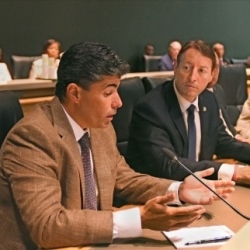Florida lawmakers will not call a special session to approve a plan for gambling expansion after all. Legislators decided to leave the issue to voters on the November ballot. After telling House Speaker Richard Corcoran and Senate President Joe Negron, State Sen. Bill Galvano texted the Herald/Times, “There will be no special [session].”
After months of negotiation, Bill Galvano’s dealmakers appeared to have a backroom deal on adding slot machines to parimutuel racetracks in 8 counties across the state. The racetracks want to become racinos in order to generate enough revenue to stay open.
The Seminole Tribe of Florida claims adding slots to racetracks is a violation of their gaming compact, which assures a monopoly over certain games in exchange for billions in tax revenues. The issue has been in the Florida court system in one form or another for over two years.
Amendment 3: Voter Control of Gambling
Incoming Florida Senate President Sen. Bill Galvano and incoming Florida House Speaker Rep. Jose Oliva conducted what the Miami Herald calls “backroom diplomacy” in the past few weeks. Their deal would have updated Florida’s gaming laws before a constitutional amendment on the November 2018 ballot would make such updates more complicated.
Amendment 3, also known as “Voter Control of Gambling“, is a statewide vote on the November ballot which would require any changes to gambling laws to pass another statewide vote. Amendment 3 is designed to shut down the expansion of gambling in the 8 counties. It would eliminate the possibility of other counties seeking to expand gambling in their area with local initiatives.
Amendment 3 Support: Seminoles and Disney
The Seminole Tribe joined with the Disney Company to fund the ballot initiative. Between the two of them, over $5 million was donated to a political action committee that supported Amendment 3. A petition drive was successful, so the two groups have a chance to shut down any expansion attempts in the coming years.
The Seminoles, who own 7 Florida tribal casinos and the Hard Rock International gaming group, want to eliminate what they consider to be illegal competition. The state/tribal gaming compact is supposed to give them a monopoly over certain forms of gaming which is negotiated with the state. The 1988 Indian Gaming Regulatory Act establishes the legal framework to do so.
The Disney Company wants to limit gambling expansion in Florida. With its largest and most iconic theme park, Disneyworld, located in Orlando, the Disney Company long has sought to make Florida a family-friendly tourist state. Disney sees gambling spread throughout many counties in the state as a bad look for Florida’s public relations and tourism.
Jose Oliva appeared to have a deal with the Seminoles earlier this month, fueling speculation that a special session to resolve the gaming compact was in play. Oliva said it proved to be too complicated, with too many state representatives balking at the deal. Oliva said of the collapse of the special session talk, “Too many components to resolve in a short time frame”, then added he and Galvano “will revisit during regular session.”
Joe Negron on Gambling Deal
Senate President Joe Negron described the framework of a plan that failed to materialize. Negron said the two sides had a plan that would have provided licensing for 6 of the 8 counties which had passed local referendums, including Gasden County in the north, Palm Beach County in the south, and Gretna County in the middle. A licensing process would have opened with 6 of the counties receiving a license for a racino.
Negron said the talks failed for three reasons: (1) uncertainty about the legal implications of the bill, (2) uncertainty about its impact on the state budget, and (3) concerns that the agenda of the special session would be extended via a “call” resolution, once the Florida state legislature was in session.
The first two concerns are intertwined. The Seminole Tribe might challenge expansion without its consent in court or it might stop payments on its gaming revenues, since the compact suggests that as a legal possibility if Florida expanded gaming without consent. While that would have troublesome PR and legal implications for the Seminoles, enough lawmakers are concerned the tribe would win court cases based on the issue.
Avoiding the Special Session’s Call
Concerns over the call option are more arcane for voters. Sen. President Negron explained how the “call” works. Negron said, “Once you’re in session, the governor can expand the call or the House and Senate can expand the call and if there is pressure to do that, that would be challenging.”
Many state representatives and senators want to tackle the issue of funding for school safety in the wake of the Stoneman Douglas school shooting. The legislative leaders are concerned a special session could turn into a political hand grenade, if Gov. Rick Scott chose to use the call option. Rick Scott is facing term limits as Florida governor, but is running for Sen. Bill Nelson’s US senate seat on the November 2018.
Losing the legislative agenda through the special session might not have been a concern =. Gov. Scott eased the pressure to have such a session last week, when he signed an agreement with the Seminoles that would keep them paying their casino revenues into 2019 — despite the lack of a working gaming compact since 2015.

